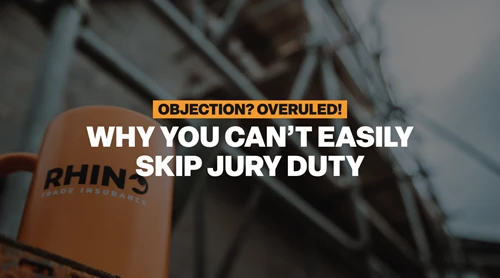HMRC established the Construction Industry Scheme (CIS) back in 1971. The purpose of the CIS is to collect income tax and National Insurance from individuals who work in the construction industry, and pass these contributions to HMRC towards the worker’s annual tax liability. The CIS was designed to help prevent tax fraud in the construction industry, and is applicable to both contractors and subcontractors.
At Rhino Trade Insurance, we know the CIS can get a little complicated. So, join us as we explore some frequently asked CIS questions, including whether you may need to register for the scheme.
What is the Construction Industry Scheme (CIS)?
In short, contractors are required by the Construction Industry Scheme (CIS) to collect tax and National Insurance from their subcontractors on behalf of the UK government.
If the subcontractor is enrolled with the CIS, contractors must deduct 20% from their subcontractors’ salary. The payments are spread out over the year rather than being due all at once. If subcontractors aren't registered, their salaries will be deducted at a rate of 30% - so it’s beneficial for many contractors to register, with some exceptions.
Who needs to register?
As per GOV.UK, you must register as an independent contractor if either of the following applies:
- You hire and pay subcontractors for trade-related work
- You are a ‘deemed contractor’ if your company isn’t in the construction field, but has spent more than £3 million on construction in the 12 months since you received your first payment.
You must register as a subcontractor if you:
- Work in construction for a main contractor
- Sometimes businesses will fall under both categories and will need to register as both a contractor and subcontractor.
Registering for CIS as a Contractor
Before hiring your first subcontractor, you must register as an employer with HMRC.This can be done online using HMRC’s website.
You will then receive a letter from HMRC which will tell you what you need to do next to start working as a Construction Industry Scheme (CIS) contractor. Once your application is processed (it can take around two weeks), you’re ready to begin hiring subcontractors.
To verify whether a subcontractor is registered for the Construction Industry Scheme, you can use the free HMRC Online service or specialised CIS accounting tools to check their status.
After signing up for CIS and verifying your subcontractors, you will be responsible for taking the correct amount of money from subcontractors' pay for income tax and National Insurance. You need to keep strict records of this and submit monthly returns to HMRC. If you don't, you could face a fine.
Registering for CIS as a Subcontractor
As a subcontractor, you aren't required to register for CIS, but in many cases doing so will result in a 10% saving on your annual tax bill.
Online registration for CIS is available for subcontractors, and all you will need is your Government Gateway ID, password, and Unique Tax Reference number to get started. (UTR).
You can register for Self Assessment and CIS simultaneously if you're a new subcontractor. Choose "working as a subcontractor" when registering for Self Assessment.
If your turnover is more than £30,000 you can opt for the Gross Payment Scheme instead. This way, your contractor won’t subtract tax and NI from what they pay you - but you must calculate, declare and pay your tax and NI liabilities yourself at the end of the tax year.
What work is covered under the scheme?
HMRC state that the following construction-related work falls under CIS. The work could be to either a permanent or temporary structure, or on civil jobs e.g. roads and bridges.
- Construction
- Repairs
- Site prep
- Demolition
- Modifications
- Dismantling
- Installing systems for heating, lighting, power etc
- Decorating
- Post-job cleaning
The CIS also applies to all types of company entities, including sole traders, partnerships, and limited companies.
Who isn't covered under the scheme?
You don't need to register for CIS if your work in construction falls into any of the following categories:
- Carpet fitting
- Hiring scaffolding
- Architecture
- Surveying
- Work funded by charities, trusts, head teachers or governing bodies.
- Work being done on a building that your business uses (excluding for sale and rental properties).
- Contracts that are worth less than £1,000 (excluding materials).
Read this CIS guide to understand the exemptions along with other important pieces of information.
Why is CIS beneficial for your business?
Whether you are an independent worker or a subcontractor, registering for CIS has the following main advantages:
Improving your finances
Instead of the 30% HMRC would take from unregistered subcontractors, contractors will only take a 20% deduction from the subcontractor.
Better control over tax and NI over the year
If you're a subcontractor and work for a contractor, there won't be any unpleasant surprises at the end of the year because your monthly deductions will be applied automatically as you go along.
How to get a CIS refund?
If you’ve been participating in the CIS scheme for a year or more, you may be eligible for a CIS refund. You can apply for a CIS tax refund online if you are a limited company subcontractor and have paid too much tax or National Insurance. You'll need these things in order to submit an online CIS remuneration claim:
- PAYE reference numbers.
- Company name, contact information, and addresses.
- Unique Tax Reference Number for the Company.
- The calculated amount you have overpaid.
Visit the GOV.UK website for more details on requesting a CIS reimbursement.
How to get help
If you need any help registering for the Construction Industry Scheme or need questions answered, the HMRC are on-hand to offer help, support and guidance.
For general queries, you can call 033 200 2310 or head to their website, where you can speak to a digital assistant.
For more information on CIS and Rhino, read our articles on our blog.
Talk to Rhino
Time is money when it comes to working in the trades, and keeping on top of your own accounting can be a pain in the backside. Why not get expert help from a company that lives and breathes the trade industry?
Not only can Rhino Trade Insurance cover your business and ensure it is safe should legal action be brought against it, but we can also assist you with your CIS reclaim.
Find out more about our insurance and CIS by calling our team on 0116 243 7904 or simply contact us here to get a quote.




